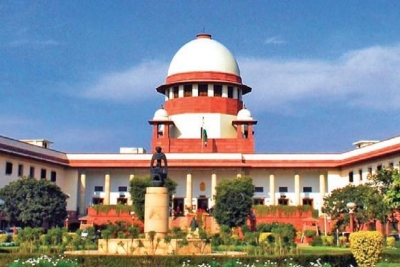Oppn claims horse-trading for toppling govts, SC firm on 'floor test' amid political crisis
By IANS | Published: July 17, 2022 03:48 PM2022-07-17T15:48:06+5:302022-07-17T16:05:42+5:30
New Delhi, July 17 The Opposition has blamed the ruling dispensation for unleashing political instability in many states ...

Oppn claims horse-trading for toppling govts, SC firm on 'floor test' amid political crisis
New Delhi, July 17 The Opposition has blamed the ruling dispensation for unleashing political instability in many states of the country, saying elected governments are being overthrown due to horse-trading. As the political crisis brews, parties look up at the Supreme Court to neutralise an attempt to topple elected governments.
In February 2016, the top court's decision to lift its order of status quo in Arunachal Pradesh cleared the road for withdrawal of the emergency and the possibility of a new government being formed with rebel Congress leader Kalikho Pul as chief minister. Pul, who became chief minister on 19 February 2016, was only in power till July 2016. He was ousted from office after an order of the Constitution bench of the Supreme Court. In July 2016, the Constitution bench said that the governor's decision to advance the floor test for NabamTuki from January 2016 to December 2015 was unconstitutional as there was no sign Tuki had lost the majority then.
On July 13, 2016 judgment in Nabam Rebia vs Deputy Speaker, Arunachal Pradesh, the apex court considered whether the governor must exercise this power in his discretion or on the aid and advice of the Council of Ministers. "In a situation where the Governor has reasons to believe that the Chief Minister and his Council of Ministers have lost the confidence of the House, it is open to the Governor to require the Chief Minister and his Council of Ministers to prove their majority in the House, by a floor test. Only in a situation, where the Government in power on the holding of such floor test is seen to have lost the confidence of the majority, it would be open to the Governor to exercise the powers vested with him under Article 174 at his own, and without any aid and advice," noted the top court in its 2016 judgment.
In May 2016, the Supreme Court gave a severe jolt to the NDA government by directing the former chief minister of Uttarakhand, Harish Singh Rawat to take a 'vote of confidence' on the floor of the Assembly on May 10 and ordered suspension of president's rule in the state from 10.30 a.m. to 1 p.m. on May 10, when the floor test was to take place. The top court declined to permit 9 rebel Congress MLAs who were disqualified by the speaker from participating in the confidence motion.
In May 2018, the apex court ordered Karnataka Chief Minister B.S. Yediyurappa to prove his majority support in the Assembly. The top court shortened the 15-day window he had received from the governor to face a floor test. The court's order came on a plea filed by the Congress-Janata Dal
Disclaimer: This post has been auto-published from an agency feed without any modifications to the text and has not been reviewed by an editor
Open in app